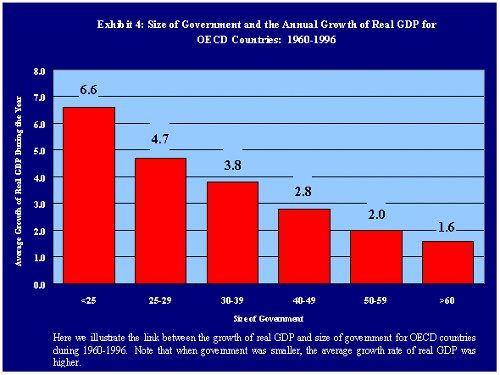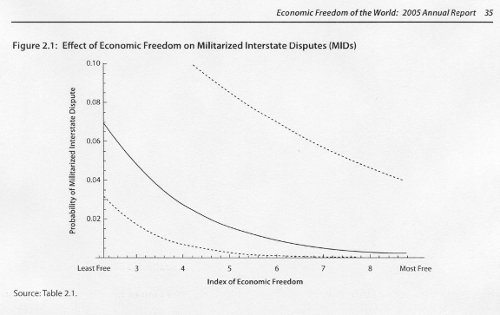Knowing how and how much the deprivation of economic freedom by government control harms the economy is necessary to an understanding of the cause of the U.S. Civil War. There are several organizations that are concerned with the measurement of economic freedom and its effects. One of these is the Fraser Institute that publishes each year an Economic Freedom of the World Annual Report.
The Heritage Foundation and the Wall Street Journal collaborate to publish an Index of Economic Freedom that ranks countries on a measure of their degree of economic freedom. Peaceful and prosperous Hong Kong and Singapore rank at the top, while heavily militarized socialist North Korea with countless tens of thousands of its citizens in political concentration and extermination camps ranks at the bottom. This extreme case of economic retardation by government control of the economy is starkly illustrated by the satellite view at night of socialist North Korea and free-market South Korea. Misery is the cost to individuals.
The Joint Economic Committee of the U.S. Senate and House of Representatives published a study of the relationship between economic growth and the size and functions of government. The economists who prepared the report investigated the effect of the increasing size of governments around the world on the economic growth of their respective nations. What they found was that increasing the size of government from less than 25% of the economy to more than 50% of the economy reduces the growth rate of the Gross Domestic Product (GDP) from 6.6% to 2.0%. It cuts the growth rate to a third. It is an enormous destruction of wealth.
The following chart from the report illustrates the effect.

Increasing the government's expenditures means that the nation's economy will slow in its growth so that it will be less able to pay for the increased spending. It is a stark illustration of the utter futility of expenditures by the government to increase economic growth.
These sources of information show that there is no lack of strong evidence that increasing government control of the economy means a decreasing growth rate of the economy, the destruction of wealth on a large scale and impoverishment of the country's citizens. Understanding the terrible losses that result from deprivation of economic freedom is a necessity for understanding the cause of the U.S. Civil War.
Of particular relevance to the U.S. Civil War is an article in the 2005 Fraser Institute Annual Report that examines the relationship between economic freedom and inter-state militarized conflict. Erik Gartzke, a professor of political science at the University of California, has measured that relationship. The results are shown in the graph below that shows a dramatic reduction in the probability of military conflict as economic freedom increases.

Professor Gartzke also found that greater democracy in government has no such dramatic effect, a finding that finds further confirmation in that the United States was an democracy but nevertheless found itself in a civil war. Once the cause of the U.S. Civil War is understood, the cause of military conflict involving other countries will become clear.
The Lincoln Republicans believed that raising tax rates to protect domestic industry would force local industry into prosperity and would therefore save on transportation costs to and from foreign countries. This was the doctrine of Henry C. Carey, Lincoln's economics advisor. They believed that the curve of national prosperity went up, not down, with increasing tariff rates. They believed that the South would gain additional markets in the protected North. They were unable to understand, or preferred not to understand, that high tariffs would cripple the South's trade with its foreign markets would would impoverish the southern section of the country.
Modern politicians, of both political parties, make promises to the elderly, the unemployed, the poor, the unions and the minorities that they will give them benefits by means of government taxation and regulation. The chart above ("Exhibit 4") shows that it will cause the country's economy to grow more slowly, crippling the government's ability to pay the increased expenditures.